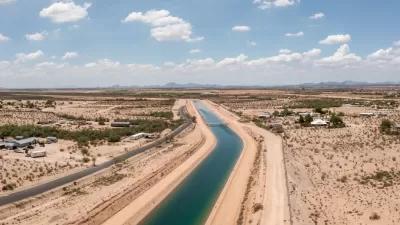As part of a plan to utilize the city's rainwater and recycle it back to lake Michigan, Chicago has been renovating its 13,00 alleys to become permeable surfaces, where rainwater can soak back into the ground. 40 alleys have been redone so far.
"Chicago's 13,000 alleys, which allow rear access to buildings, date back to the 1800s. The 1,900 miles of back alleys ease access for garbage collection, loading and parking."
"They also make up about 3,500 acres of impermeable surface, which has created a big problem."
"Many of the alleys were built without connections to storm sewers. Rainwater puddles on the pavement and can run into buildings, sometimes flooding basements."
"The extreme alley makeover started with the pavement. The alleys are being resurfaced with concrete, asphalt or paving stones that are permeable -- that is, water runs through them like a sieve to the dirt beneath."
"Microbes that thrive on stuff like fertilizer and oil are seeded into the pavement or migrate there naturally. They cleanse the water of pollutants from cars and lawns. The cleaner water makes its way into the groundwater, called an aquifer, and then flows into Lake Michigan."
FULL STORY: Chicago's back alleys filter rainwater for Lake Michigan

Maui's Vacation Rental Debate Turns Ugly
Verbal attacks, misinformation campaigns and fistfights plague a high-stakes debate to convert thousands of vacation rentals into long-term housing.

Planetizen Federal Action Tracker
A weekly monitor of how Trump’s orders and actions are impacting planners and planning in America.

San Francisco Suspends Traffic Calming Amidst Record Deaths
Citing “a challenging fiscal landscape,” the city will cease the program on the heels of 42 traffic deaths, including 24 pedestrians.

Half of Post-Fire Altadena Home Sales Were to Corporations
Large investors are quietly buying up dozens of properties in Altadena, California, where a devastating wildfire destroyed more than 6,000 homes in January.

Opinion: What San Francisco’s Proposed ‘Family Zoning’ Could Really Mean
Mayor Lurie is using ‘family zoning’ to encourage denser development and upzoning — but could the concept actually foster community and more human-scale public spaces?

Jacksonville Launches First Autonomous Transit Shuttle in US
A fleet of 14 fully autonomous vehicles will serve a 3.5-mile downtown Jacksonville route with 12 stops.
Urban Design for Planners 1: Software Tools
This six-course series explores essential urban design concepts using open source software and equips planners with the tools they need to participate fully in the urban design process.
Planning for Universal Design
Learn the tools for implementing Universal Design in planning regulations.
Gallatin County Department of Planning & Community Development
Heyer Gruel & Associates PA
JM Goldson LLC
City of Camden Redevelopment Agency
City of Astoria
Transportation Research & Education Center (TREC) at Portland State University
Jefferson Parish Government
Camden Redevelopment Agency
City of Claremont





























